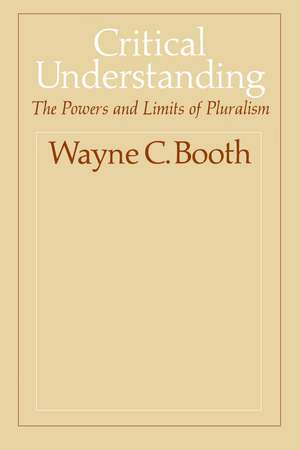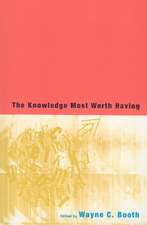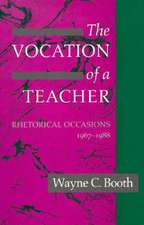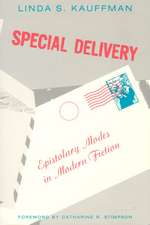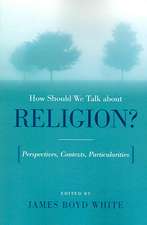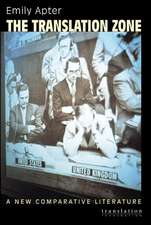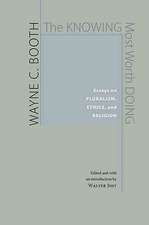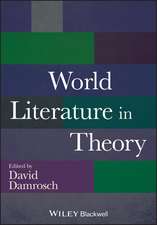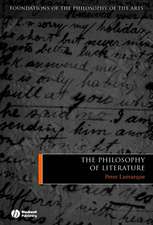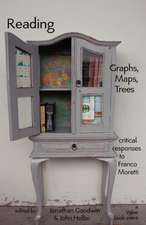Critical Understanding: The Powers and Limits of Pluralism
Autor Wayne C. Boothen Limba Engleză Paperback – sep 1982
Critics will always disagree, but, maintains Wayne Booth, their disagreement need not result in critical chaos. In Critical Understanding, Booth argues for a reasoned pluralism—a criticism more various and resourceful than can be caught in any one critic's net. He relates three noted pluralists—Ronald Crane, Kenneth Burke, and M. H. Abrams—to various currently popular critical approaches. Throughout, Booth tests the abstractions of metacriticism against particular literary works, devoting a substantial portion of his discussion to works by W. H. Auden, Henry James, Oliver Goldsmith, and Anatole France.
Preț: 386.06 lei
Nou
Puncte Express: 579
Preț estimativ în valută:
73.87€ • 77.34$ • 61.12£
73.87€ • 77.34$ • 61.12£
Carte tipărită la comandă
Livrare economică 07-21 aprilie
Preluare comenzi: 021 569.72.76
Specificații
ISBN-13: 9780226065557
ISBN-10: 0226065553
Pagini: 422
Dimensiuni: 152 x 229 x 25 mm
Greutate: 0.45 kg
Ediția:Revised
Editura: University of Chicago Press
Colecția University of Chicago Press
ISBN-10: 0226065553
Pagini: 422
Dimensiuni: 152 x 229 x 25 mm
Greutate: 0.45 kg
Ediția:Revised
Editura: University of Chicago Press
Colecția University of Chicago Press
Notă biografică
Wayne C. Booth (1921–2005) was the George Pullman Distinguished Service Professor at the University of Chicago. His many books include The Rhetoric of Fiction, A Rhetoric of Irony, The Power and Limits of Pluralism, The Vocation of a Teacher, and Forthe Love of It, all published by the University of Chicago Press.
Cuprins
Preface
1. The Plurality of Modes as a Problem
Babel
Six Attitudes toward Critical Variety and Conflict
"Pluralistic" Stimulation of Chaotic Warfare
Hope for Semantic Resolution
Monism
Skepticism
Eclecticism
Methodological Pluralism
Problems Raised by This Pluralism
Confusion with Other Pluralisms
Confusion with Relativism
Paradoxical Umbrellas and Other Analogies
2. Ronald Crane and the Pluralism of Discrete Modes
Skepticism, Dogmatism, and the Plurality of Human Achievements
The New Semantics of Modes
Purposes
The Plurality of Definitions of "Surgical Ward" as Subject
Analogical Placements
Literal Placements
A Digression on Crane's Notion of the Literal Poem
The Search for Sufficient Causes
The Use of "Extrinsic" Evidence
Judgment at Last: This Poem of This Kind
Method
Lumping and Splitting
Deduction and Induction
The Reflexive Discrimination of Problems
Principles
Charges of Dogmatism and Relativism: How to Test a Mode
Coherence
Correspondence
Comprehensiveness
Umbrella Paradox or Harmonious Chorus?
3. Kenneth Burke's Comedy: The Multiplication of Perspectives
Burke in Crane's Quadrate
Burke in Burke's Pentagon
Method: Beginnings and Endings
Consequences
Literature and Criticism as "Equipment for Living"
A Way into and around "Surgical Ward"
The Tests of a Good Terministic Screen
The Dance as Cure
Burke's Reply
Dancing with Tears in My Eyes
4. M. H. Abrams: History as Criticism and the Plurality of Histories
The Charge of Relativism Once More
Reduction of a Story to Ten Static Propositions
Reduction of a Story to Static Arguments
History as Literary Criticism
"Surgical Ward" One Last Time
Objections and Replies
Abrams' Reply
Rationality and Imagination in Cultural History
5. The Pursuit of Understanding as a Limit of Pluralism
Problems for the Pluralist of Pluralisms
The Failure to Understand (Correspondence)
The Failure to be Pluralistic (Adequacy)
No Escape intoa Demonstrable Harmony (Coherence)
The Pluralist as Pragmatist
"Criticism" and "Poetry" as Essentially Contested Concepts
Pluralisms as Rival Pragmatisms
Three Inseparable Values
Vitality
Justice
Understanding
6. In Defense of the Reader and of Alien Modes: The Need for Overstanding
Justice Again
Intrinsic/Extrinsic Repudiated
Questions and Responses Insisted Upon by the Text
"Improper" Questions
Violations of Common Knowledge (of Data)
Violations of Danda
Idiosyncracy as a Source of Violation
Modes as a Source
Violation as Respect, Respect for Violation
7. Our Many Different Businesses with Art
Understanding, Once Again
Understanding Five Different "Authors"
Writers, Dramatized Authors, Implied Authors, Career-Authors, and Public "Characters"
The Authority of the Writer: The Law of Disparate Giftedness
The Authority of the Implied Author
Four Kinds of Reader Misreading
Preconceptions about the Writer and the "Career-Author": A Lesson by the Master
Indifference to the Writer's Task: Telling a Ghost Story
Preconceptions about a Proper Structure: The Citizen of the World
The Uselessness of Rules
The Eclipse of the Implied Author by the "Master"
Thaïs
Overstanding, Once Again
Conclusion: Modes and Pluralisms as Shared Tenancies
Booth Craned, Burked, and Bramsed
Limits Again
Critical Understanding as an End in Itself
Appendix
Notes
Index of Concepts
Index of Persons and Titles
1. The Plurality of Modes as a Problem
Babel
Six Attitudes toward Critical Variety and Conflict
"Pluralistic" Stimulation of Chaotic Warfare
Hope for Semantic Resolution
Monism
Skepticism
Eclecticism
Methodological Pluralism
Problems Raised by This Pluralism
Confusion with Other Pluralisms
Confusion with Relativism
Paradoxical Umbrellas and Other Analogies
2. Ronald Crane and the Pluralism of Discrete Modes
Skepticism, Dogmatism, and the Plurality of Human Achievements
The New Semantics of Modes
Purposes
The Plurality of Definitions of "Surgical Ward" as Subject
Analogical Placements
Literal Placements
A Digression on Crane's Notion of the Literal Poem
The Search for Sufficient Causes
The Use of "Extrinsic" Evidence
Judgment at Last: This Poem of This Kind
Method
Lumping and Splitting
Deduction and Induction
The Reflexive Discrimination of Problems
Principles
Charges of Dogmatism and Relativism: How to Test a Mode
Coherence
Correspondence
Comprehensiveness
Umbrella Paradox or Harmonious Chorus?
3. Kenneth Burke's Comedy: The Multiplication of Perspectives
Burke in Crane's Quadrate
Burke in Burke's Pentagon
Method: Beginnings and Endings
Consequences
Literature and Criticism as "Equipment for Living"
A Way into and around "Surgical Ward"
The Tests of a Good Terministic Screen
The Dance as Cure
Burke's Reply
Dancing with Tears in My Eyes
4. M. H. Abrams: History as Criticism and the Plurality of Histories
The Charge of Relativism Once More
Reduction of a Story to Ten Static Propositions
Reduction of a Story to Static Arguments
History as Literary Criticism
"Surgical Ward" One Last Time
Objections and Replies
Abrams' Reply
Rationality and Imagination in Cultural History
5. The Pursuit of Understanding as a Limit of Pluralism
Problems for the Pluralist of Pluralisms
The Failure to Understand (Correspondence)
The Failure to be Pluralistic (Adequacy)
No Escape intoa Demonstrable Harmony (Coherence)
The Pluralist as Pragmatist
"Criticism" and "Poetry" as Essentially Contested Concepts
Pluralisms as Rival Pragmatisms
Three Inseparable Values
Vitality
Justice
Understanding
6. In Defense of the Reader and of Alien Modes: The Need for Overstanding
Justice Again
Intrinsic/Extrinsic Repudiated
Questions and Responses Insisted Upon by the Text
"Improper" Questions
Violations of Common Knowledge (of Data)
Violations of Danda
Idiosyncracy as a Source of Violation
Modes as a Source
Violation as Respect, Respect for Violation
7. Our Many Different Businesses with Art
Understanding, Once Again
Understanding Five Different "Authors"
Writers, Dramatized Authors, Implied Authors, Career-Authors, and Public "Characters"
The Authority of the Writer: The Law of Disparate Giftedness
The Authority of the Implied Author
Four Kinds of Reader Misreading
Preconceptions about the Writer and the "Career-Author": A Lesson by the Master
Indifference to the Writer's Task: Telling a Ghost Story
Preconceptions about a Proper Structure: The Citizen of the World
The Uselessness of Rules
The Eclipse of the Implied Author by the "Master"
Thaïs
Overstanding, Once Again
Conclusion: Modes and Pluralisms as Shared Tenancies
Booth Craned, Burked, and Bramsed
Limits Again
Critical Understanding as an End in Itself
Appendix
Notes
Index of Concepts
Index of Persons and Titles
